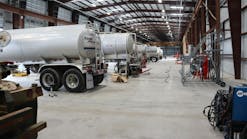State of the association: NTTC leaders provide key updates in board meeting
The National Tank Truck Carriers (NTTC) has not gone unscathed by the coronavirus pandemic.
Like many associations and companies in the country, its budget was stretched thin by efforts to mitigate the spread of COVID-19, including limiting the size of gatherings, which made it impossible to host events and diminished engagement.
But Ryan Streblow, who replaced Daniel Furth as NTTC president in late August, said in his interim president’s report—delivered during a board meeting that was part of NTTC’s virtual Tank Truck Week—that tank truck carriers have proven “incredibly resilient,” and NTTC’s mission to support the industry hasn’t changed.
“When it gets down to it, most of us want to all but forget 2020,” Streblow said. “It’s been without question an unbelievably challenging year, and for many of us that’s an understatement. Numerous operators that I’ve had the opportunity to speak with in our membership and our segment have endured unprecedented challenges, and yet history is repeating itself with many carriers as they are incredibly resilient in taking on the impacts from this pandemic in our industry head-on, adapting and innovating as they begin to emerge from this global crisis.
“Hearing the stories of not only the harsh impacts but more importantly the positive steps taken within a never-quit mentality makes me truly honored to be a part of this association.”
Streblow addressed the state of the association Oct. 1, following reports from NTTC’s budget and finance, and advocacy committees that updated the association’s financial standing and lobbying efforts in Washington.
The virtual board meeting was led by Streblow and NTTC chairman Kevin Jackson of Liquid Cargo.
Budget update
NTTC needs its members’ support now more than ever.
J&M Tank Lines CEO Harold Sumerford Jr., the association’s treasurer, said NTTC made strides in balancing its budget last year, after struggling the previous three years, but 2020 wasn’t looking good. Overall, NTTC’s investment balance was $4.9 million in January 2020, and it was at $4.7 million as of the board meeting.
“Part of 2019’s (performance) was due to meetings being cancelled, and we cut a lot of expenditures by cancelling meetings, so that’s not necessarily what the organization’s operating for, but it did bring us back close to where we need to be,” he said. “So we are looking at all expenditures to do everything we can for the 2021 budget, to get it up in the blue.
“The 2020 budget … is pretty much overshot with all this COVID stuff, and revenues dropping, and that’s something we have to look at going into next year. Our revenue brackets could be decreasing, with carriers dropping down, which will decrease our revenue. So the staff’s being challenged with some very serious (needs) to cut costs and increase revenue.”
Advocacy update
Britton Clarke, president of BC Consulting, joined the meeting to provide a Washington update.
She deemed the atmosphere in the nation’s capital before the presidential election “toxic,” saying it was a “challenging time” to work in Washington. She said Sen. John Cornyn, a Republican from Texas who was re-elected, called it the worst environment he’s seen in his 18 years during a Zoom meeting on NTTC’s behalf.
Another senator, Sen. Jon Tester, a Democrat from Montana who’s a “friend to trucking,” said the language he’s heard used to describe colleagues across the aisle is “disturbing,” but he hopes things will settle down after Nov. 3, according to Clarke.
On a more positive note, Clarke praised partial successes regarding the Fixing America’s Surface Transportation (FAST) Act, and the dry bulk axle tolerance NTTC has requested. The FAST Act, which governs the country’s transportation operations, was extended for one year, providing a measure of certainty for current projects moving forward, and the dry bulk axle tolerance made headway in the House.
“We were successful after a lot of hard work, and kudos to you and the many, many truckers who came to Washington to walk the halls of Congress with me, and tell the good story, so we were successful with including dry bulk tolerance in the House-side transportation bill,” Clarke said. “We are keeping those discussions alive, so that when we do get a full highway bill, hopefully a year from now, the dry bulk tolerance is included.”
Clarke also pointed to the association’s success with the five-year brake-activated pulsating lamp exemption granted by the Federal Motor Carrier Safety Administration in October, and said work on securing the use of electronic shipping papers is ongoing. She said an American Trucking Associations (ATA) hazardous materials policy committee planned to review the petition in November and then offer feedback.
“We did miss the right time to get this done with PHMSA (the Pipeline and Hazardous Materials Safety Administration), meaning that it was a short window where, because of the virus, they’re trying to really unburden some regulatory things, to allow businesses to be more effective, but depending on the outcome of the election, hopefully we can get it done,” Clarke said.
PAC report
After surpassing $100,000 in political action committee (PAC) contributions in 2019, funding was way down in 2020 due to a lack of events, Streblow said. NTTC had 104 donors in 2019 and was at only 22 as of Oct. 1. And with total expenditures on lobbying efforts also down significantly from last year, NTTC focused on helping key Republican candidates who view the trucking business more favorably secure re-election.
“It’s my understanding that, for NTTC, it is a priority we keep and maintain the Republican majority in the Senate, so we looked at the key races, and also to be sure they have been supporters of trucking, and invested in those races,” said Clarke, who added that she did not expect help from liberal Democrats.
Streblow then outlined how NTTC plans to prioritize legislative and regulatory efforts going forward, saying the association will take a three-tiered approach to its focus on key issues “from the fifth wheel back.”
With issues in Tier 1 that directly impact the tank truck industry, NTTC will lead the charge and go all in financially, Streblow said. On Tier 2 issues that affect surface transportation, the association will partner with other groups and limit its financial commitment and allocated resources; and for Tier 3 issues involving surface transportation that are “on the radar,” NTTC will support the industry but with no financial obligation.
Streblow called the plan a rough draft, and said NTTC’s advocacy committee will dig into the issue further in its next session.
Association update
“Tremendous change” in 2020 includes a new NTTC president, although Streblow still held the interim title into November. If permanently installed, he would be only the fifth president in the association’s 75-year history.
Furth served as vice president from 2008 to 2013, when he succeeded John Conley as NTTC’s fourth president. Conley spent 12 years as the editor of Bulk Transporter before joining the association in 1989, and serving as president from 2006 to 2013. He followed Cliff Harvison (1972-2005) and Austin Sutherland (1945-72).
“There have been some outstanding leaders in this organization, from laying the groundwork, to building on the efforts in advocacy, safety recognition, industry awareness and tank truck education,” Streblow said. “I truly believe NTTC is one of the strongest member-driven organizations in transportation. With me, that philosophy will not change. Rather, it will be elevated to look at leveling and enhancing both the business and the value of the association.”
Streblow said the tank truck association and industry are facing “numerous challenges.” Currently, he said, NTTC leaders are mapping out short-term strategies to address cost containment and looking to formulate a long-term approach to addressing growing revenue challenges through diversified revenue streams.
The association will continue to advocate for the industry regardless of the election’s outcome, he continued, and work to grow its educational offerings. “We’re working with our safety and security council to evaluate content for education, and review both in-person and online tank truck-specific education solutions,” Streblow said. “I’m really excited for that component of this association and believe that’s going to have a much larger part as a revenue stream opportunity as we continue to evolve.”
NTTC also is evaluating opportunities to provide carriers tank truck-specific benchmarking and best practice groups via an industry provider, which Streblow said will add value—and hopefully help NTTC grow its membership.
“Without question, our inability to host an in-person meeting or conference in the past six to seven months has hit the association hardest from both a revenue perspective and an engagement perspective,” Streblow concluded. “We do not anticipate we will be able to host a gathering for at least another five months (through February 2021). That has forced us to pivot on our deliverables for engagement.
“Those deliverables will continue to be reviewed for advanced and innovative modes to provide membership with needed industry information and, more importantly, the networking opportunity many of you crave.”










